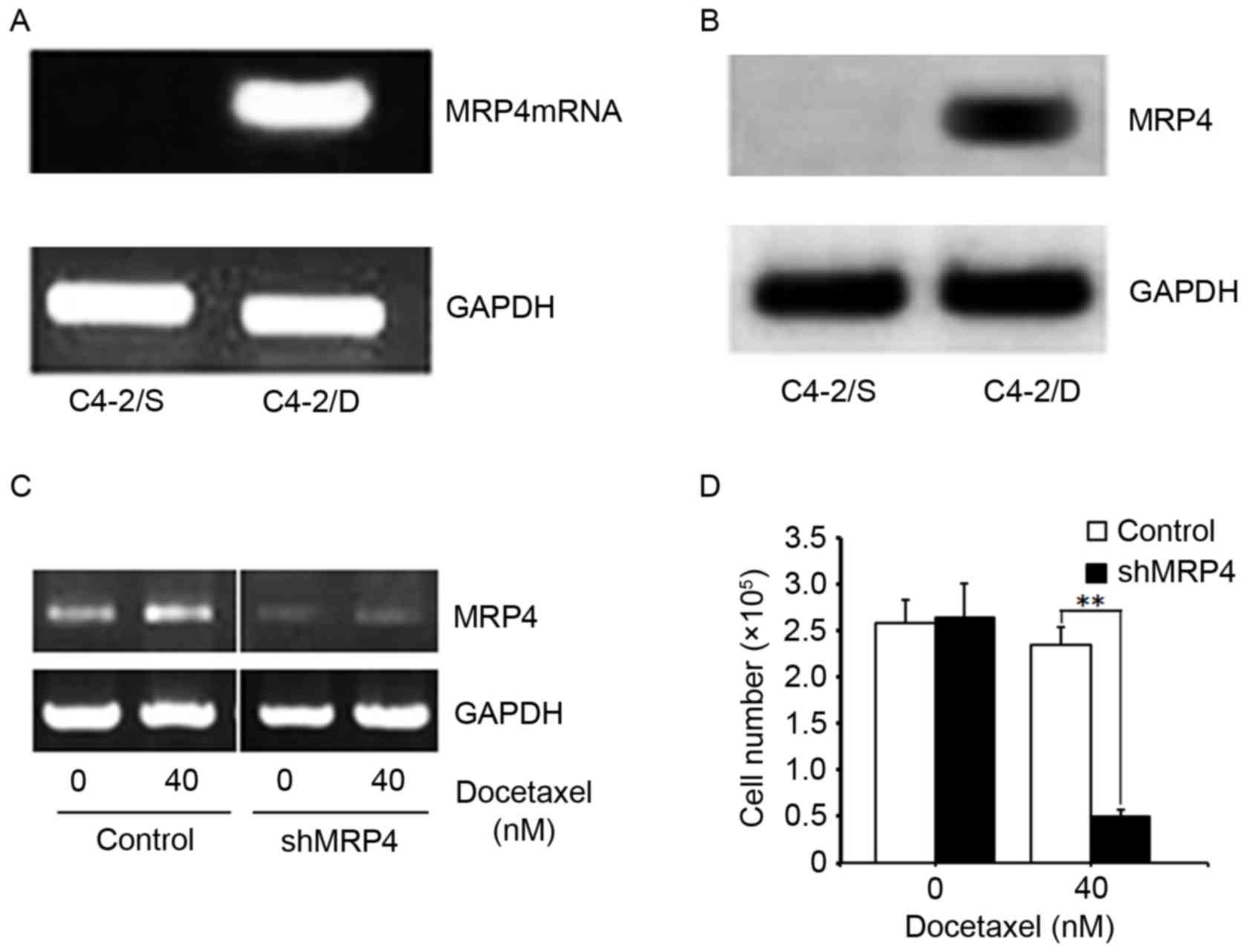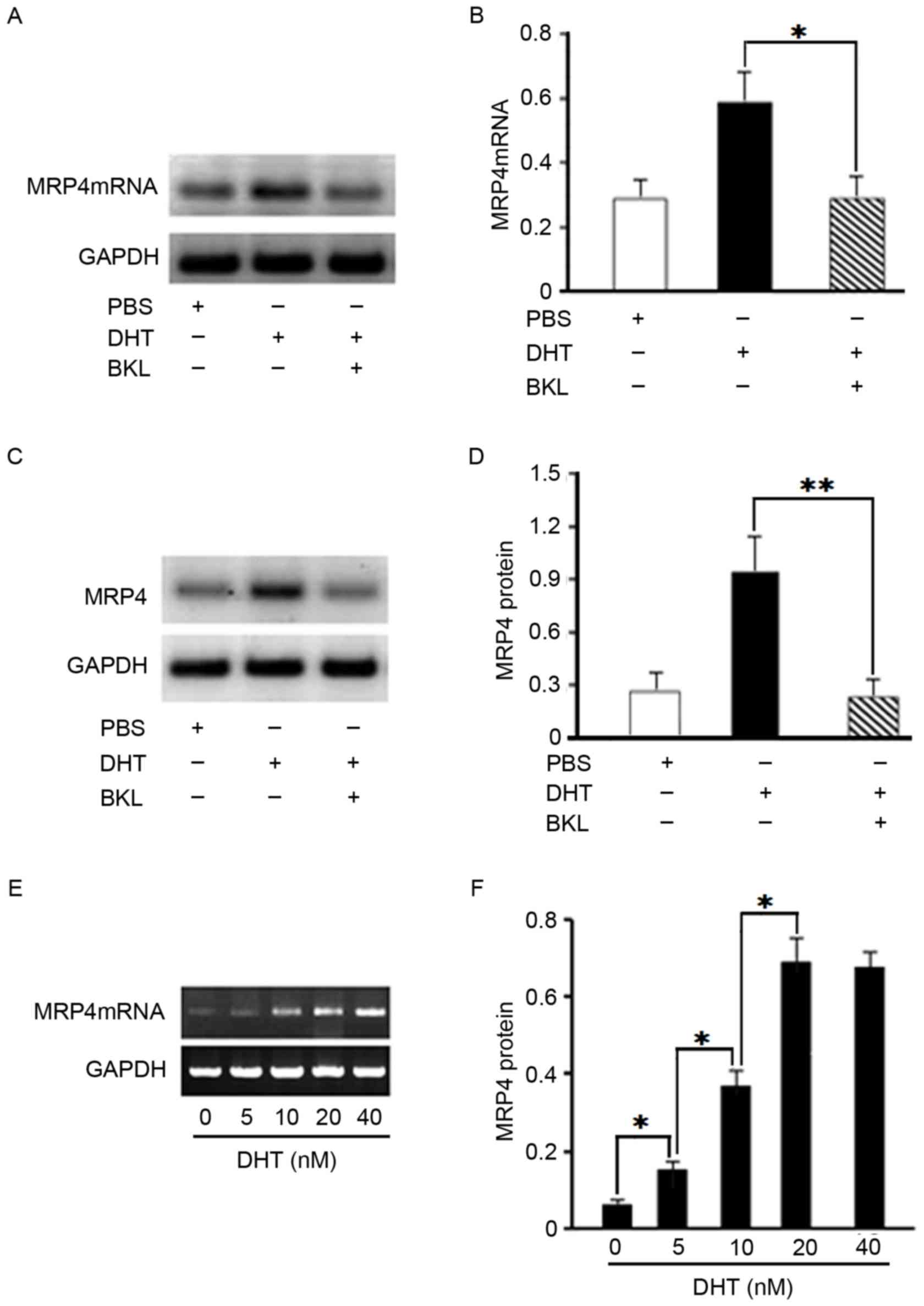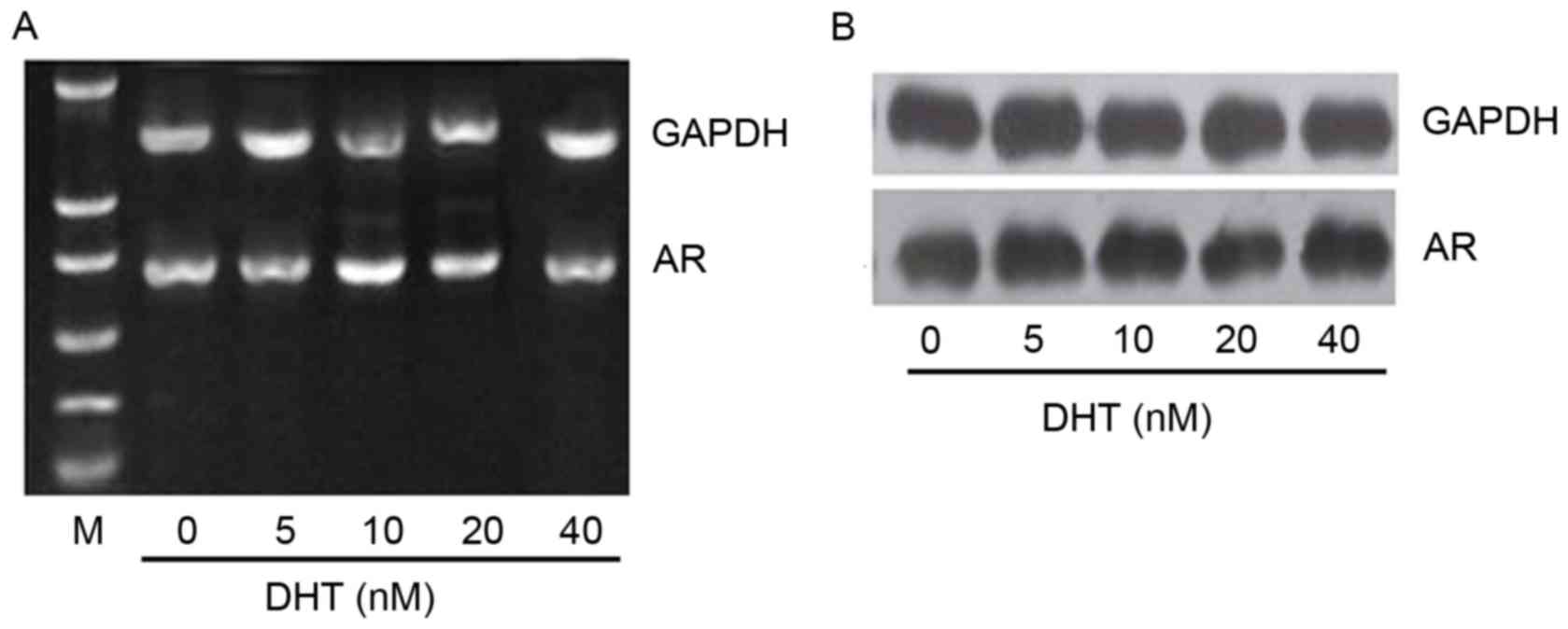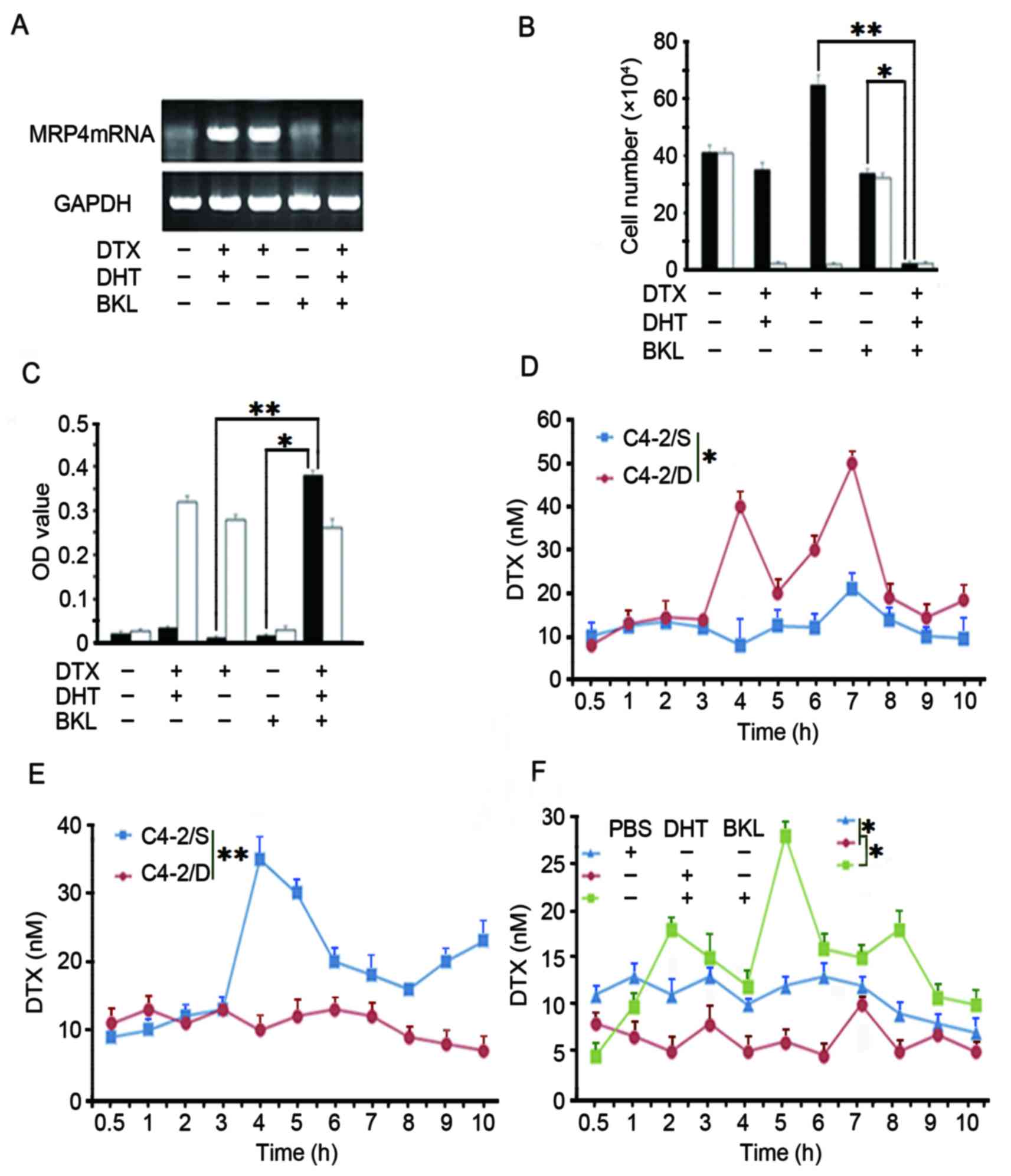|
1
|
Caffo O, De Giorgi U, Fratino L, Alesini
D, Zagonel V, Facchini G, Gasparro D, Ortega C, Tucci M, Verderame
F, et al: Clinical outcomes of castration-resistant prostate cancer
treatments administered as third or fourth line following failure
of docetaxel and other second-line treatment: Results of an italian
multicentre study. Eur Urol. 68:147–153. 2015. View Article : Google Scholar : PubMed/NCBI
|
|
2
|
Ramaswamy B and Puhalla S: Docetaxel: A
tubulin-stabilizing agent approved for the management of several
solid tumors. Drugs Today (Barc). 42:265–279. 2006. View Article : Google Scholar : PubMed/NCBI
|
|
3
|
Madan RA, Pal SK, Sartor O and Dahut WL:
Overcoming chemotherapy resistance in prostate cancer. Clin Cancer
Res. 17:3892–3902. 2011. View Article : Google Scholar : PubMed/NCBI
|
|
4
|
de Bono JS, Oudard S, Ozguroglu M, Hansen
S, Machiels JP, Kocak I, Gravis G, Bodrogi I, Mackenzie MJ, Shen L,
et al: Prednisone plus cabazitaxel or mitoxantrone for metastatic
castration-resistant prostate cancer progressing after docetaxel
treatment: A randomised open-label trial. Lancet. 376:1147–1154.
2010. View Article : Google Scholar : PubMed/NCBI
|
|
5
|
Ryan CJ, Smith MR, Fizazi K, Saad F,
Mulders PF, Sternberg CN, Miller K, Logothetis CJ, Shore ND, Small
EJ, et al: Abiraterone acetate plus prednisone versus placebo plus
prednisone in chemotherapy-naive men with metastatic
castration-resistant prostate cancer (COU-AA-302): Final overall
survival analysis of a randomised, double-blind, placebo-controlled
phase 3 study. Lancet Oncol. 16:152–160. 2015. View Article : Google Scholar : PubMed/NCBI
|
|
6
|
Loriot Y, Miller K, Sternberg CN, Fizazi
K, De Bono JS, Chowdhury S, Higano CS, Noonberg S, Holmstrom S,
Mansbach H, et al: Effect of enzalutamide on health-related quality
of life, pain, and skeletal-related events in asymptomatic and
minimally symptomatic, chemotherapy-naive patients with metastatic
castration-resistant prostate cancer (PREVAIL): Results from a
randomised, phase 3 trial. Lancet Oncol. 16:509–521. 2015.
View Article : Google Scholar : PubMed/NCBI
|
|
7
|
Kantoff PW, Higano CS, Shore ND, Berger
ER, Small EJ, Penson DF, Redfern CH, Ferrari AC, Dreicer R, Sims
RB, et al: Sipuleucel-T immunotherapy for castration-resistant
prostate cancer. N Engl J Med. 363:411–422. 2010. View Article : Google Scholar : PubMed/NCBI
|
|
8
|
Parker C, Nilsson S, Heinrich D, Helle SI,
O'Sullivan JM, Fosså SD, Chodacki A, Wiechno P, Logue J, Seke M, et
al: Alpha emitter radium-223 and survival in metastatic prostate
cancer. N Engl J Med. 369:213–223. 2013. View Article : Google Scholar : PubMed/NCBI
|
|
9
|
Kunisawa S, Tange C and Shimozuma K:
Realities in cost-effectiveness analyses: A study of
castration-resistant prostate cancer patients using a medical
claims database. Springerplus. 4:6242015. View Article : Google Scholar : PubMed/NCBI
|
|
10
|
Zhu Y, Liu C, Armstrong C, Lou W, Sandher
A and Gao AC: Antiandrogens Inhibit ABCB1 Efflux and ATPase
activity and reverse docetaxel resistance in advanced prostate
cancer. Clin Cancer Res. 21:4133–4142. 2015. View Article : Google Scholar : PubMed/NCBI
|
|
11
|
Hour TC, Chung SD, Kang WY, Lin YC, Chuang
SJ, Huang AM, Wu WJ, Huang SP, Huang CY and Pu YS: EGFR mediates
docetaxel resistance in human castration-resistant prostate cancer
through the Akt-dependent expression of ABCB1 (MDR1). Arch Toxicol.
89:591–605. 2015. View Article : Google Scholar : PubMed/NCBI
|
|
12
|
Zheng WE, Chen H, Yuan SF, Wu LL, Zhang W,
Sun HY and Chen WJ: Overexpression of βIII-tubulin and survivin
associated with drug resistance to docetaxel-based chemotherapy in
advanced gastric cancer. J BUON. 17:284–290. 2012.PubMed/NCBI
|
|
13
|
Li W, Zhai B, Zhi H, Li Y, Jia L, Ding C,
Zhang B and You W: Association of ABCB1, β tubulin I, and III with
multidrug resistance of MCF7/DOC subline from breast cancer cell
line MCF7. Tumour Biol. 35:8883–8891. 2014. View Article : Google Scholar : PubMed/NCBI
|
|
14
|
Hara T, Ushio K, Nishiwaki M, Kouno J,
Araki H, Hikichi Y, Hattori M, Imai Y and Yamaoka M: A mutation in
beta-tubulin and a sustained dependence on androgen receptor
signalling in a newly established docetaxel-resistant prostate
cancer cell line. Cell Biol Int. 34:177–184. 2010. View Article : Google Scholar : PubMed/NCBI
|
|
15
|
Tamaki H, Harashima N, Hiraki M, Arichi N,
Nishimura N, Shiina H, Naora K and Harada M: Bcl-2 family
inhibition sensitizes human prostate cancer cells to docetaxel and
promotes unexpected apoptosis under caspase-9 inhibition.
Oncotarget. 5:11399–11412. 2014. View Article : Google Scholar : PubMed/NCBI
|
|
16
|
Arai T, Miyoshi Y, Kim SJ, Akazawa K,
Maruyama N, Taguchi T, Tamaki Y and Noguchi S: Association of GSTP1
expression with resistance to docetaxel and paclitaxel in human
breast cancers. Eur J Surg Oncol. 34:734–738. 2008. View Article : Google Scholar : PubMed/NCBI
|
|
17
|
Hendrikx JJ, Lagas JS, Song JY, Rosing H,
Schellens JH, Beijnen JH, Rottenberg S and Schinkel AH: Ritonavir
inhibits intratumoral docetaxel metabolism and enhances docetaxel
antitumor activity in an immunocompetent mouse breast cancer model.
Int J Cancer. 138:758–769. 2016. View Article : Google Scholar : PubMed/NCBI
|
|
18
|
Kelly WK, Halabi S, Carducci M, George D,
Mahoney JF, Stadler WM, Morris M, Kantoff P, Monk JP, Kaplan E, et
al: Randomized, double-blind, placebo-controlled phase III trial
comparing docetaxel and prednisone with or without bevacizumab in
men with metastatic castration-resistant prostate cancer: CALGB
90401. J Clin Oncol. 30:1534–1540. 2012. View Article : Google Scholar : PubMed/NCBI
|
|
19
|
Keppler D: Multidrug resistance proteins
(MRPs, ABCCs): Importance for pathophysiology and drug therapy.
Handb Exp Pharmacol. 1–323. 2011.
|
|
20
|
Oprea-Lager DE, Bijnsdorp IV, VAN
Moorselaar RJ, VAN DEN Eertwegh AJ, Hoekstra OS and Geldof AA:
ABCC4 Decreases docetaxel and not cabazitaxel efficacy in prostate
cancer cells in vitro. Anticancer Res. 33:387–391. 2013.PubMed/NCBI
|
|
21
|
Savaraj N, Wu C, Wangpaichitr M, Kuo MT,
Lampidis T, Robles C, Furst AJ and Feun L: Overexpression of
mutated MRP4 in cisplatin resistant small cell lung cancer cell
line: Collateral sensitivity to azidothymidine. Int J Oncol.
23:173–179. 2003.PubMed/NCBI
|
|
22
|
Russel FG, Koenderink JB and Masereeuw R:
Multidrug resistance protein 4 (MRP4/ABCC4): A versatile efflux
transporter for drugs and signalling molecules. Trends Pharmacol
Sci. 29:200–207. 2008. View Article : Google Scholar : PubMed/NCBI
|
|
23
|
Zhang YH, Wu Q, Xiao XY, Li DW and Wang
XP: Silencing MRP4 by small interfering RNA reverses acquired DDP
resistance of gastric cancer cell. Cancer Lett. 291:76–82. 2010.
View Article : Google Scholar : PubMed/NCBI
|
|
24
|
Cai C, Omwancha J, Hsieh CL and
Shemshedini L: Androgen induces expression of the multidrug
resistance protein gene MRP4 in prostate cancer cells. Prostate
Cancer Prostatic Dis. 10:39–45. 2007. View Article : Google Scholar : PubMed/NCBI
|
|
25
|
Ho LL, Kench JG, Handelsman DJ, Scheffer
GL, Stricker PD, Grygiel JG, Sutherland RL, Henshall SM, Allen JD
and Horvath LG: Androgen regulation of multidrug
resistance-associated protein 4 (MRP4/ABCC4) in prostate cancer.
Prostate. 68:1421–1429. 2008. View Article : Google Scholar : PubMed/NCBI
|
|
26
|
Li YF, Zhang SF, Zhang TT, Li L, Gan W,
Jia HT, Xie S, Ji HH and He DL: Intermittent tri-weekly docetaxel
plus bicalutamide in patients with castration-resistant prostate
cancer: A single-arm prospective study using a historical control
for comparison. Asian J Androl. 15:773–779. 2013. View Article : Google Scholar : PubMed/NCBI
|
|
27
|
Lattanzio L, Tonissi F, Monteverde M,
Milano G, Merlano MC and Lo Nigro C: Differential molecular
mechanism of docetaxel-octreotide combined treatment according to
the docetaxel-resistance status in PC3 prostate cancer cells.
Anticancer Drugs. 24:120–130. 2013. View Article : Google Scholar : PubMed/NCBI
|
|
28
|
Sampath J, Adachi M, Hatse S, Naesens L,
Balzarini J, Flatley RM, Matherly LH and Schuetz JD: Role of MRP4
and MRP5 in biology and chemotherapy. AAPS PharmSci. 4:E142002.
View Article : Google Scholar : PubMed/NCBI
|
|
29
|
Lasagna N, Fantappiè O, Solazzo M,
Morbidelli L, Marchetti S, Cipriani G, Ziche M and Mazzanti R:
Hepatocyte growth factor and inducible nitric oxide synthase are
involved in multidrug resistance-induced angiogenesis in
hepatocellular carcinoma cell lines. Cancer Res. 66:2673–2682.
2006. View Article : Google Scholar : PubMed/NCBI
|
|
30
|
Moul JW and Dreicer R: Focusing on
testosterone. Urology. 78 5 Suppl:S476–S477. 2011. View Article : Google Scholar : PubMed/NCBI
|
|
31
|
Zhang G, Liu X, Li J, Ledet E, Alvarez X,
Qi Y, Fu X, Sartor O, Dong Y and Zhang H: Androgen receptor splice
variants circumvent AR blockade by microtubule-targeting agents.
Oncotarget. 6:23358–23371. 2015. View Article : Google Scholar : PubMed/NCBI
|
|
32
|
Thadani-Mulero M, Portella L, Sun S, Sung
M, Matov A, Vessella RL, Corey E, Nanus DM, Plymate SR and
Giannakakou P: Androgen receptor splice variants determine taxane
sensitivity in prostate cancer. Cancer Res. 74:2270–2282. 2014.
View Article : Google Scholar : PubMed/NCBI
|
|
33
|
Jain S, Chakraborty G, Raja R, Kale S and
Kundu GC: Prostaglandin E2 regulates tumor angiogenesis in prostate
cancer. Cancer Res. 68:7750–7759. 2008. View Article : Google Scholar : PubMed/NCBI
|
|
34
|
Madrigal-Martinez A, Cazaña FJ and
Fernández-Martínez yA: Role of intracellular prostaglandin E2 in
cancer-related phenotypes in PC3 cells. Int J Biochem Cell Biol.
59:52–61. 2015. View Article : Google Scholar : PubMed/NCBI
|
|
35
|
Terada N, Inoue T, Kamba T and Ogawa O:
Novel treatment for prostate cancer targeting prostaglandins. Nihon
Rinsho. 72:2141–2146. 2014.(In Japanese). PubMed/NCBI
|



















